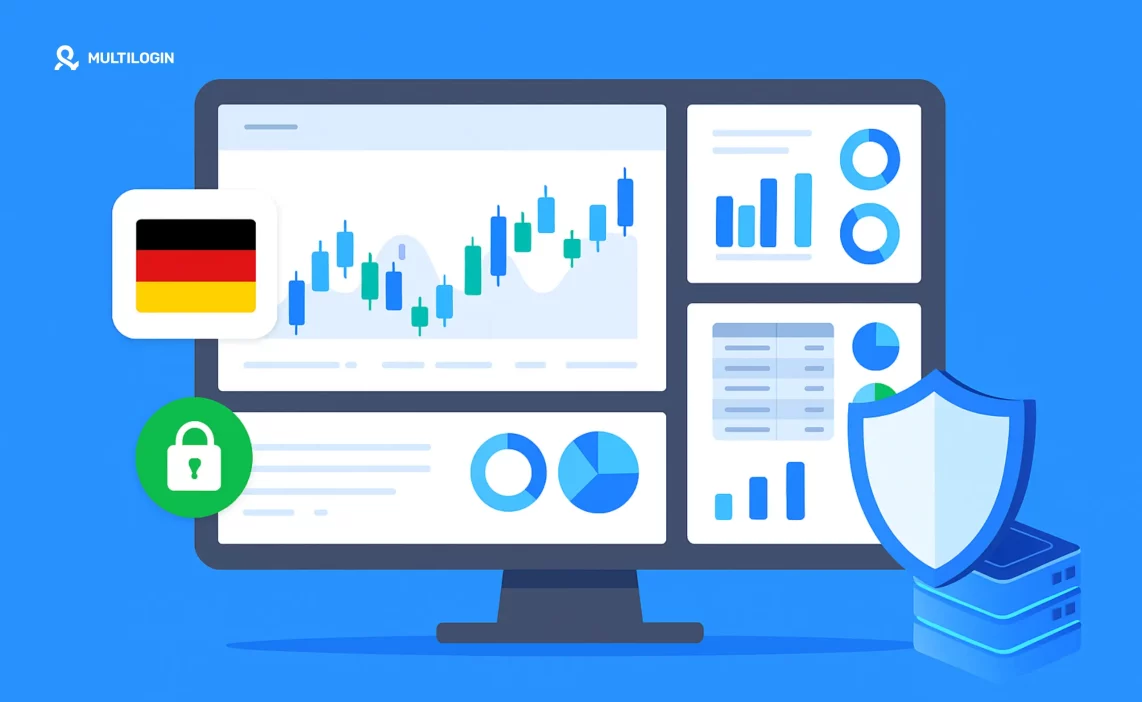Running multiple accounts online isn’t easy in Germany. Whether you’re an affiliate marketer in Berlin, a dropshipper in Hamburg, or a crypto trader in Frankfurt, platforms like Facebook, Amazon, and TikTok monitor every login. One geolocation mismatch or weak fingerprint, and your account gets banned instantly.
According to Statista, Germany is one of the top five European countries for digital advertising spend, with billions flowing into online ads every year. That means competition is fierce — and platforms tighten their rules daily.
👉 If you don’t want to risk sudden bans, the smartest move is to use the most reliable antidetect browser in Germany — Multilogin. For just €1.99, you can test it with 5 browser profiles and 200 MB of built-in proxy traffic.
What Is an Antidetect Browser?
An antidetect browser (anti detect browser) is a tool that helps you:
- Change your browser fingerprint (Canvas, WebGL, Audio, etc.).
- Manage multiple accounts without getting flagged.
- Use proxies to appear as if you’re in different locations.
- Simulate mobile devices with a mobile anti detect browser.
In Germany, where GDPR compliance and data privacy are strict, you need a solution that doesn’t just hide you — it keeps your workflows smooth, legal, and professional.
Why Antidetect Browsers Are Popular in Germany
- E-commerce Expansion – Sellers on Amazon.de and eBay.de need multiple seller accounts to stay competitive.
- Affiliate Marketing – German affiliates run campaigns across Facebook, TikTok, and Google Ads. More accounts = more reach.
- Crypto Trading – Frankfurt’s fintech scene uses multiaccount setups for airdrop farming and decentralized trading.
- Social Media Management – Agencies in Berlin manage 100s of accounts for clients.
- Remote Work & Teams – German companies use antidetect browsers for secure logins across different departments.
Without an antidetect browser, these activities risk bans, shadow bans, or costly downtime.
8 Best Antidetect Browsers for Germany in 2026
Choosing the right antidetect browser in Germany isn’t just about avoiding bans — it’s about scaling securely, staying GDPR-compliant, and running smooth multiaccount management without constant technical headaches. Below are the eight antidetect browsers German users are most likely to encounter, ranked by relevance.
1. Multilogin (Best Overall for Germany)
If you’re serious about multiaccount management in Germany, Multilogin should be your first choice.
Why it stands out in Germany:
- GDPR-friendly cloud storage ensures compliance with strict EU privacy laws.
- Built-in residential proxies remove the hassle of buying third-party proxies.
- Mobile anti detect browser support lets you emulate Android for TikTok, Instagram, and other mobile-first platforms.
- Team scaling: Unlimited seats on Business plans, perfect for Berlin agencies or e-commerce teams.
- 24/7 multilingual support, including German-speaking agents.
👉 German affiliates, dropshippers, and agencies prefer Multilogin because it combines everything (browser + proxies + automation) in one subscription.
2. GoLogin
GoLogin has gained popularity among German freelancers and MMO (make money online) communities.
Pros:
- Easy to set up.
- Decent fingerprint masking.
- Affordable starter plans.
Cons for German users:
- No proxies included — you’ll need to buy them separately, which adds hidden costs.
- Reliability issues: GoLogin sometimes fails on fingerprint checkers like Pixelscan.
- Limited GDPR focus compared to Multilogin.
GoLogin is okay for beginners, but when scaling serious German e-commerce or ad accounts, it often becomes more expensive and less reliable than Multilogin.
3. AdsPower
AdsPower markets itself as a team antidetect browser with built-in automation (RPA).
Pros:
- Role-based team collaboration.
- RPA toolkit for no-code automation.
- Proxy management dashboard.
Cons for German users:
- Performance problems when running 200+ profiles.
- No proxies included, meaning extra setup for German users who need residential IPs.
- Ticket-based support — slow compared to 24/7 live Multilogin support.
AdsPower attracts some German agencies, but many eventually migrate to Multilogin due to performance and support limitations.
4. Kameleo
Known as a mobile-first antidetect browser, Kameleo focuses on device emulation.
Pros:
- Strong mobile anti detect browser capabilities.
- Supports Android and iOS device profiles.
- Decent automation support.
Cons for German users:
- Expensive compared to Multilogin (€59/month+).
- Proxies not included.
- Desktop fingerprinting weaker than Multilogin.
Kameleo is popular among German TikTok and Instagram affiliates, but it lacks the all-in-one value of Multilogin.
5. Incogniton
Incogniton is often seen as an entry-level antidetect browser.
Pros:
- Free plan available (good for beginners).
- Simple, easy-to-use interface.
Cons for German users:
- Limited fingerprint protection.
- No proxies included.
- Free plan caps at a few profiles — useless for scaling.
Incogniton may appeal to German beginners testing anti detect browsers, but it’s not robust enough for professional use.
6. VMLogin
VMLogin is popular in forums because of its cheap pricing.
Pros:
- Budget-friendly entry point.
- Works with Selenium and Puppeteer automation.
Cons for German users:
- Weak fingerprint protection — easily flagged by advanced detectors.
- Updates are slow compared to Multilogin.
- No proxies included.
VMLogin is a risky choice for German users running sensitive campaigns on Amazon.de, Facebook, or TikTok.
7. Undetectable Browser
A newer tool in the German market, Undetectable claims advanced fingerprinting.
Pros:
- Fresh design.
- Some automation compatibility.
Cons for German users:
- Still unproven — smaller user base than Multilogin.
- No built-in proxies.
- Limited documentation and support.
German professionals are cautious with Undetectable since reliability and GDPR compliance haven’t been widely tested.
8. Linken Sphere (Legacy)
Linken Sphere was once a well-known anti detect browser, especially in Eastern Europe.
Pros:
- Advanced fingerprint manipulation.
- Long history in the market.
Cons for German users:
- Reputation issues — often associated with black-hat activities.
- Complex interface, not beginner-friendly.
- No proxies included, no modern features like cloud storage.
Linken Sphere is less relevant in 2026, especially for German users who need compliance and stability.
👉 Start your Multilogin trial for €1.99 and experience why agencies in Berlin, sellers in Hamburg, and affiliates across Germany already trust it as their go-to antidetect browser.
Why Multilogin Is Best for Germany
- GDPR-friendly: Secure cloud storage & data handling.
- Proxy advantage: Every plan comes with built-in premium proxies — unlike competitors.
- German support: 24/7 multilingual team, including German speakers.
- Scalability: From 10 profiles to 10,000 accounts, perfect for freelancers and enterprises.
- Reliability: Tested daily across 50+ websites.
How Berlin Agencies Use Multilogin
Berlin is often called the startup capital of Europe, with over 500 tech startups launched each year. Many of these companies — from marketing agencies to SaaS providers — rely on social media and ad platforms to reach customers.
Here’s the problem:
- A single agency might manage 50+ Facebook ad accounts across different clients.
- Each account needs a unique environment to avoid cross-linking.
- One fingerprint or proxy mismatch can cause multiple clients’ campaigns to collapse.
That’s why Berlin agencies are switching from VMLogin, AdsPower, and GoLogin to Multilogin:
- Multiaccount management at scale: Agencies create hundreds of isolated browser profiles in Multilogin, each with its own fingerprint, cookies, and proxy.
- Proxy browser advantage: Built-in residential proxies save hours of setup and eliminate the cost of juggling external providers.
- Team-ready workflows: Junior account managers and senior strategists can collaborate in real time with role-based permissions.
- Mobile anti detect browser profiles: For platforms like TikTok and Instagram, agencies run Android emulation directly in Multilogin.
For agencies in Germany, where reputation and client trust are critical, Multilogin isn’t just an anti detect browser — it’s an insurance policy against bans.
👉 Start your 3-day Multilogin trial for €1.99 and keep your accounts alive, compliant, and profitable.
Frequently Asked Questions About Best Antidetect Browser Germany
The best antidetect browser in Germany is Multilogin. It combines advanced fingerprinting, built-in proxies, and GDPR-compliant cloud storage for secure multiaccount management.
Both VMLogin and AdsPower are popular, but they require third-party proxies. Multilogin is better for German users because it includes proxies and complies with EU privacy laws.
Yes. A proxy browser like Multilogin allows you to run multiple Amazon.de seller accounts safely by assigning each profile its own IP, fingerprint, and cookies.
Yes. TikTok is mobile-first, and German affiliates rely on a mobile anti detect browser. Multilogin supports Android profile emulation to keep accounts safe.
Multilogin is best for affiliates because it includes pre-farmed cookies, proxies, and automation tools for running multiple ad accounts without bans.
Yes, but you must use a trusted solution. Multilogin’s secure local or cloud storage ensures compliance with German regulations while handling sensitive logins.
Conclusion: The Clear Winner for Germany
Germany’s digital economy is thriving, but account bans and platform restrictions make scaling a nightmare without the right tools.
- VMLogin is cheap but risky.
- AdsPower is powerful but costly and proxy-dependent.
- GoLogin, Kameleo, and Incogniton all have gaps.
👉 That leaves Multilogin as the clear #1 antidetect browser for Germany.
With built-in proxies, advanced fingerprinting, GDPR compliance, and team scalability, it’s the only all-in-one anti detect browser German businesses truly need.
Don’t wait until your Amazon.de seller account or Facebook ads get banned. Take control now with the tool trusted by agencies, affiliates, and e-commerce pros across Germany.



